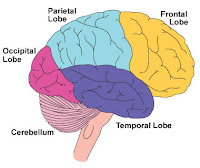 Walter Kaye has conducted some very interesting research, which reveals that the brain patterns of anorexics are different than those of healthy women. “This means they react and think in different ways to the ordinary person and that they are more likely to go on to develop anorexia regardless of whether they have been exposed to images of super-thin models,” Dr. Kaye said. Wow, is the British press having a field day with that statement:
Walter Kaye has conducted some very interesting research, which reveals that the brain patterns of anorexics are different than those of healthy women. “This means they react and think in different ways to the ordinary person and that they are more likely to go on to develop anorexia regardless of whether they have been exposed to images of super-thin models,” Dr. Kaye said. Wow, is the British press having a field day with that statement:"Anorexia 'cannot be picked up by looking at photographs of super-thin models'" [Times]
"Stick-thin models such as Kate Moss do not encourage young women to become anorexic, say scientists." [Daily Mail]
"Anorexia not models' fault" [The Sun]
Okay, villagers. Put down your torches. The models are innocent! The gist here is that people don't look at pictures of models and immediately spiral into severe eating disorders. Did anyone really believe it was that simple anyway? But let's not excuse the media and the fashion industry from the table so quickly. Even if they're not solely responsible for girls and women developing full-blown anorexia, they certainly play a role in the even bigger epidemics of disordered eating, drastic dieting, and poor body image.
I recently met four intelligent, articulate high school students who are participating in the Dove Reality Diaries. With zero hesitation, all four of them said they would sign up for plastic surgery (from liposuction to nose jobs) in a heartbeat if given the opportunity. Now try and convince me that all those media images of thinness and perfection don't have a dangerous impact.








1 comment:
I don't believe images of models cause eating disorders - EDs are biological brain disease that may be attracted to that type of media and confused by it - but the models and media do hurt THE REST OF US.
We are steeped in those images and it normalizes a profile that is prepubescent. As consumers, we can choose to shun it, and I think we should.
Post a Comment